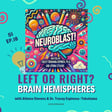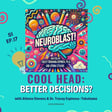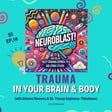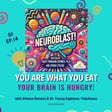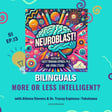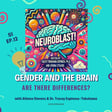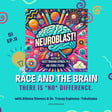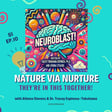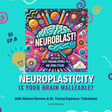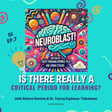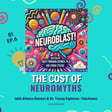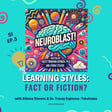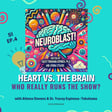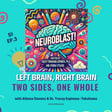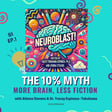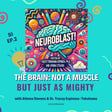Become a Creator today!Start creating today - Share your story with the world!
Start for free
00:00:00
00:00:01

Sleep Perchance to Learn
In this episode of Neuroblast, Athena and Tracey explore how sleep supports learning. They debunk myths about sleep-learning, explain how REM sleep consolidates memory, and highlight the role of dreams in creativity and problem-solving. The takeaway? Quality sleep is essential for effective learning, focus, and brain health.
Original music by: Julian Starr
Transcript
Athena's Sleep Experiment
00:00:06
Speaker
To sleep perchance to dream. Ay, there's the rub! For in that sleep of death my dreams may come.
00:00:19
Speaker
Athena, are you trying to memorize Shakespeare in your sleep? I thought it might work, you know, like osmosis, put it under my pillow - doesn't sleep help with
Introduction to Neuroblast Podcast
00:00:31
Speaker
Learning?
00:00:31
Speaker
Hello and welcome to Neuroblast. Today we are breaking down - - a myth of whether you can really learn while you're asleep or does sleep - effect learning at all.
00:00:50
Speaker
I'm Athena Stevens, Shakespearean - - - actor, writer, and neuroenthusiast.
Hosts' Backgrounds
00:01:00
Speaker
And I'm Tracey Tokuhama- Espinosa. I teach a course at Harvard University Summer School called the Neuroscience of Learning, an Introduction to Mind, Brain, Health, and Education, and I'm an international educational consultant.
00:01:13
Speaker
And I would just like to add for this episode, neither of us are on enough sleep because it's the holidays and we are both are going crazy. But I think both - Tracey and myself have the energy to put this myth to bed once and for all. What do you think, Tracey?
00:01:40
Speaker
That's a good way to put it. Yes - I mean, the myth about whether or not you can learn in your sleep is pretty interesting.
Can You Learn in Your Sleep?
00:01:48
Speaker
And and it's um it's related to this idea that that sleep is actually a behavior. And you can learn to do it better than you do it right now, right? Like you can modify all behaviors, you can modify sleep.
00:02:00
Speaker
And what one of the things that some people who are really good at sleeping have figured out is that you can definitely tackle problems in your sleep. Now, you can never learn anything completely new. Like you can't, you know, stick on the recording of, you know, Arabic or Chinese and wake up in the morning and speak it. No, that doesn't work. So learning something completely new doesn't work.
00:02:23
Speaker
But you can rehearse what you have learned consciously in your sleep. And you can definitely learn learn in that way. So there's um tons of literature, there's tons of historical references to to sleep and dreaming um and understanding the difference between sleep and
Historical Insights on Sleep and Genius
00:02:40
Speaker
dreaming. Sleep to restore your body and dreaming to to be able to consolidate memory and and make those links - - in your brain.
00:02:47
Speaker
Um, those have been researched for at least 50, 60, 70 years and now we have even better information, the more current information pointing us to this idea that um those people like Einstein's who would go to sleep or Tchaikovsky go to sleep with an idea or a question or tune in their head and wake up.
00:03:06
Speaker
the next morning with solutions, um mathematical formulas or - whole concerts written in out. Um, those are not necessarily the exception to the rule. Those are some people who just capitalized on the ability to use this state of consciousness. You're never fully unconscious, right-- you're, you're always rather conscious in sleep-- um, to resolve problems or to come up with new solutions to things. And so, you can rehearse things, but you can't learn totally new things as you sleep.
00:03:37
Speaker
So basically, I should not be trying to learn my lines for Hamlet while I sleep, but can still dream about playing the role with Idris Elba as Ophelia?
00:03:55
Speaker
Yeah, that's - - right. Well, what you can do is you can, if you have explicitly, overtly, loudly, out loud, in your conscious state, rehearsed that, that can be rehearsed, continued rehearsal in your dreams, definitely.
00:04:12
Speaker
And I have noticed this when I go to learn lines, is if i need to learn lines to deliver them later that day, it is much less effective than if I get sleep in between.
00:04:31
Speaker
why is that? Well, I think there's two main main thoughts there. One is that um there's a lot of research that actually shows that a nap is as good as ah as a full night's sleep if you're able to go you know zoom straight into REM stage. But typical sleep stages...
The Science of Sleep and Memory
00:04:50
Speaker
we have um sleep stages are measured in electrical waves, right? And so you'll go down from a waking state and fall down. You go down, down, down until deep sleep, which is, you know, the delta waves, which are really super slow, as close to death as you get when you're alive, right?
00:05:06
Speaker
And then you begin to surface back up into shorter waves and then you have what is called REM sleep, which is rapid eye movement, which is um when most of your dreams occur.
00:05:17
Speaker
And in that rapid eye movement, that dreaming stage, it's only about 25% of your all of your sleep stage is actually in dreams. That's as close to being awake as as normal. So if you awake naturally, you're always waking from a dream stage, for for example.
00:05:34
Speaker
Now, the key idea is how do you capitalize on REM sleep if it takes that long to get there? And so people who learn to power nap, for example, can really put their heads down and zip they go. Instead of going down through this long, deep stage down into deep sleep and having this big cycle that lasts 90 minutes before you get back up to dreaming, they actually zoom straight into REM sleep and so they can take advantage of that and consolidate their memories. And so if what you're doing, if later in the afternoon, if you've rehearsed, rehearsed, rehearsed, then take a quick power nap and zoom into REM sleep and consolidate that into long-term memory, the retrieval is easier, right?
00:06:12
Speaker
But as you say, most people don't know how to do that. It takes practice. It takes, you know, to be a good, you know, power napper, right? But if you normally would just go to sleep and you wake up fresh in the morning, the reason is because sleep allows your body to refocus, to be able to pay attention, right?
00:06:33
Speaker
Um, and then dreaming allows for the consolidation of memory. And so what we know is that all learning depends on well-functioning attention systems and well-functioning memory systems. And so your ability to pay attention - is part of this restorative process of the body, um, whereas your ability to memorize things is really part of this reconsolidation of memories that happens during REM sleep, which is due to a unique combination of neurotransmitters in the brain, which are really only present during REM sleep.
00:07:05
Speaker
This is Robert Stickle's fascinating work back in 2004, 2006, where he shows that it's vital to get into REM stage in order to have this consolidation of memory, which means you have long term memory and long term memory is really what you need to be able to pull up those lines when you're on stage and to be able to come back to that with a sort of this effortless grace
00:07:29
Speaker
of pulling up the lines without even looking like you're thinking about it, that's because it's in long-term memory, and that's only something that happens after you've consolidated them in sleep. Now, I know we're talking about trauma--
00:07:43
Speaker
I think next weel, but - very soon-- um, but I have read evidence that in cases of PTSD, along with neurological cases,
00:08:00
Speaker
Um, REM sleep is compromised. Do you know about this and if REM sleep is compromised for any reason--
00:08:18
Speaker
Let me back up. Everyone says you always sleep when you dream. No--
00:08:26
Speaker
Let me try that again. Hi. Um - So, I have read cases where
00:08:36
Speaker
there is a thought that, or there is at least a correlation, but--
00:08:45
Speaker
-- I have read cases that there appears to be a correlation between less REM sleep and trauma--particularly something like PTSD- -or less REM sleep and neuromuscular disability.
00:09:09
Speaker
We always hear, if you sleep, you dream, you just don't remember it. But yet, it seems like there are things that can make you go into less REM sleep.
00:09:26
Speaker
Can you talk to me about that? Yeah - you're you're absolutely right about that.
Sleep Disorders and Memory Disruption
00:09:33
Speaker
what the-- the, um, what's very, very difficult right now is that we talk about sleep in these four different stages based on EEGs, based on electrical -
00:09:44
Speaker
measurements in your brain and how your your brain goes through stages of sleep. And one thing that's quite clear is that you look at people who do suffer from PTSD, for example, that they're their sleep is disturbed, but in different levels. And some people, it's, you know, they never get into deep sleep because they're always hypervigilant and so they don't ever get to delta and so their bodies are never rested.
00:10:08
Speaker
And other people who might have difficulties that they spend short abbreviated or - very little time in REM sleep which means that they're not getting the this full advantage of this dream stage and Robert Stickbold's work showed you know that there's this very unique combination of neurotransmitters in the brain um during REM sleep during this this ah very lighter stage of sleep we have all these sleep spindles in - you're basically the electrical and chemical balances are permitting you to have
00:10:39
Speaker
these connections in your brain, which lead to the crazy sensations that we have in in dreaming but they also allow for kind of a filtering out and a cleaning out stage and so there's another angle to this. So we have electrical activity of chemical activity, but we also have sort of, um we we don't call them trash keepers anymore, but the role - of of glial cells is really complex, but there is this sort of sweeping - away of things that aren't going to be used in the future. And so this sort of
00:11:11
Speaker
clearing out um of you know old connections that aren't going to be used anymore - and sort of there's a restorative nature to to to having all of the different stages of sleep in the right balance.
00:11:25
Speaker
And if you have suffered from trauma, you can have different stages of your sleep disturbed, which cause different kinds of problems. Remember, if you are in this hypervigilant stage and never get into deep sleep, you don't ever rest completely. And you're just always exhausted because physically you have not restored, your body's not coming back into to balance.
00:11:47
Speaker
Um, but if you're missing out on REM so sleep, you're also not getting that benefit of, you know, clearing things out and also consolidating those memories. And so different ah types of problems, sleep difficulties cause different types of problems depending on the sleep stage that they're affecting.
00:12:08
Speaker
A Friend of mine works as a neurologist and he says that with brain injuries um and neuromuscular conditions, sleep often, well nearly - disrupted in some way.
00:12:36
Speaker
And and - I would have to agree with that. I think that there's, remember we talked about how, you know, finding this, your body's balance and in um many disorders, it's very difficult to actually, because your baseline balance is not what quote unquote the norm would be, it's very, very hard then to return to something that your body is not used to ever
Inefficiency of All-Nighters
00:12:59
Speaker
being in, right? So that is a huge problem.
00:13:02
Speaker
Ah, to return to another aspect of you know, just this vital role of finding this right balance, you and and something that's quite common and a huge mistake
00:13:17
Speaker
Um, sometimes I would remember my my kids would say, oh, yes, I've got a test tomorrow. I need to study. And they begin, you know, to feverishly review things, and they're up late at night. And I'd say, you know what?
00:13:29
Speaker
Sorry, it's time to go to sleep. Oh, no, I have to keep studying. I have to keep studying. I say, you have no idea how inefficient you are being right now. Did you know that sleeping is probably the best thing you could do for your brain right now to review this information?
00:13:44
Speaker
Um, and the key idea here is you know even if you take these large standardized tests, you know the main recommendation is not to try to review the entire year's work, it's basically review lightly, have a good snack, go to bed early, because you want to to feel, you you want this restorative sleep, you know, deep sleep, but you also want to be able to, to recall and use long term memory when you wake up. And so pulling an all nighter is one of the dumbest things you could do if learning is really um your your goal.
00:14:15
Speaker
We have, you can actually see, I see this in my class often- - not often because my, my students are - they know better, but you they'll stay up all night,
00:14:26
Speaker
They'll sort of, you know, vomit out their answers onto the page. They may get a very good grade. You know, you could get an A, but if you ask them the same question 24 hours later, they have no idea because it did not get into consolidation. It was not consolidated into long-term memory. It was only held in this like sort of working memory store until they were able to finish the task and then they move on. They did not really learn it. So all-nighters are a particularly bad way to go about approaching learning.
00:14:55
Speaker
I tend to think that if you are depending on an all-nighter to learn, your ship has already sailed. That's a good way to put it. mean, I think it can be slightly different with papers where you're creating something, but on the whole, if you need to learn something overnight.
00:15:21
Speaker
A, you needed to be paying it attention before now. And B, it's too late. Your ship has sailed. You need to... Suc cumb to your fate and get a good night's sleep so that you can emotionally handle it. That's a really good point. And that's very much like, um we we use a funny term, it's called sleep hygiene.
00:15:47
Speaker
It's just like, you know, your bodily hygiene, how you have to help- keep yourself, you know, basically clean in order for your body to function well. Well, sleep hygiene is actually creating the conditions under which you have high quality sleep.
00:16:02
Speaker
And I wish we were to pay more attention to this because, um, it would help us with certain, you know, really core habits.
Improving Sleep Quality
00:16:09
Speaker
Like your bedroom should only be for two things, you know, sleep and sex, but you're not going to have TVs or computers or, or your iPad right next to you or sleep with your phone.
00:16:17
Speaker
That's horrible. That's a horrible way to - and sleep hygiene has definitely been interrupted, um, by the invention of the cell phone, which people do sleep with, which is pretty, pretty rotten because, you know, you get alerts going off all night long, disturbing your sleep all the time.
00:16:34
Speaker
So - try to have good sleep hygiene. That also means like not drinking tons of caffeine, you know, just a few hours before you have to go to sleep or things like that. Right? So having good sleep hygiene is a good first individual step towards improving ah the quality of sleep that you get.
00:16:54
Speaker
And with that,
00:17:00
Speaker
without that good sleep hygiene, you are basically never going to perform your best. Yeah, and I think one of the really- and I would like, I'm not sure how we can do this as far as like ah circling back or editing this, Athena- but I think the whole trauma thing and returning back to this idea of of trauma and disturbed sleep and all the rest of that, it's really, really important to know that um people who do have difficulty sleeping for whatever reasons, um,
00:17:37
Speaker
how we treat this can also contribute to problems. What do I mean by that? um For example, kids who might have ADHD, for example, and are given Ritalin or something like that to to sort of help them focus.
00:17:54
Speaker
Yes, while they're sitting in the class, they may be well-focused, but it could lead to sleep disturbances, which then means, yes, they paid attention in class, but no, at night they did not consolidate those ideas into long-term memory. So,
00:18:10
Speaker
If you don't have both attention and memory, you have no learning. And so the difficulty is that part of the treatment to attend to a certain behavior might disturb some chemical balance that influences whether or not you actually do have long-term learning. So um similarly, when we're talking about trauma, people who might be treated for PTSD to help them get to sleep, they get to sleep, they get into the long-term sleep, but it's not that they necessarily have the same natural sleep patterns, these sleep cycles of around 90 minutes, they're not hitting all of these different cycles in, in a way that they would normally hit them. And so going getting helping somebody get to sleep doesn't mean that they are getting what they need out of sleep or getting into all of those different cycles. And so that kind of treatment is very, very important. It's the treatment
00:19:03
Speaker
adding to the problem, into the long-term problem, or is it actually really, you know, helping? And so we have to be sure that we're not causing additional problems when we try to take care of other sleep problems.
00:19:17
Speaker
Is there such a thing as sleep debt? Oh, there's definitely, you can fall asleep, say, say you've, you know, shortchanged yourself all week long and then you think on the weekend you can make it up.
00:19:31
Speaker
That's just not a thing. You might feel, you know, bodily that you've done something, but once you've passed a certain stage, it's really, I don't know if you've ever had this where you've slept way too long and you start to have these incredibly bizarre dreams and then when you wake up, you're even more tired. So, - - - that's happened to me.
00:19:53
Speaker
Yeah, so there's a a very weird thing that your body, again, we're talking about homeostasis. What is the right balance there? Um, and when we said, you know, everything in moderation we've said in past weeks, right, when we're talking about food. Well, same thing.
00:20:06
Speaker
Sleep, you know, is you can't overindulge in this and and you can't make up for it. So if you think you've lost an hour of sleep here, an hour of sleep there, an hour of sleep, and I'm going make up for it on the weekend, it doesn't work like that. And so we have to be very, very careful when we try to we think about the way sleep um works.
00:20:25
Speaker
What body is looking for is balance, which means so more or less consistency on a daily basis. Um, some of the best sleepers are people who just basically they have the same sleep pattern Monday through Sunday. It's not that they just have a work week sleep pattern and a weekend sleep pattern.
00:20:42
Speaker
and they have, they're more or less consistent throughout. So
00:20:50
Speaker
Action steps - pay attention to your sleep. Don't shortchange it. Have good sleep hygiene, which loads of popular scientists have spoken about on other podcasts.
00:21:09
Speaker
Any other big takeaway we need to keep in mind? Not only for learning, but also mind-brain health.
00:21:20
Speaker
Absolutely.
Benefits of Natural Waking
00:21:21
Speaker
One of the key things, the main things um about sleep that we could all fix tomorrow if we wanted to, is to wake up naturally.
00:21:31
Speaker
I know it sounds you know easier said than done, but when you wake up, remember we mentioned these stages of sleep where you go down into deep sleep and you come back up and you go through REM sleep and then you go back down again.
00:21:43
Speaker
You spend about, you know, an average around five cycles of these 90 minute cycles, five, six cycles a night. And this is how you get to this average of eight hours of sleep. But some people are short sleepers and they, you know, four and a half - - - -
00:21:56
Speaker
is normal. Well, eight might be average, but the key is it's not how many hours of sleep, it's the quality of sleep that you're getting. And so if you can train yourself to wake up naturally, that means that when you're coming out of this last cycle, out throughout a dream stage, when you're completing your dream stage and you wake yourself up naturally, you will feel refreshed all the time.
00:22:21
Speaker
The main problem is if only 25% of your sleep is dreaming, Your alarm clock will typically go off in 75 percent - of the other time, which means if your alarm clock goes off when you're in deep sleep, you spend the rest of the day walking around like you're in a fog.
00:22:39
Speaker
So what is the key? The key would be to learn how to wake up naturally, Right? As you're coming out of the dream stage. And so there are actually apps for that, believe it or not, that they figure out, you say, okay, the latest I can get up tomorrow is 630 because I have to meet Athena by seven. So the latest I can get up is 630.
00:22:59
Speaker
what this it's kind of creepy your phone has a microphone right? So your phone figures out when-- Hang on, hang on, - you just told us not to sleep with the phone- I know but you can put it near you or for your alarm or whatever if you had an alarm, now I don't ever use it because I don't need it because I practiced on how to wake up out of a new stage-- but yeah we, we all hate you-- yeah but here's how this app works. And and I'll tell you, and I dare you to try it for a month because the first month is free and that's all you really need to get used to it. But the app actually perceives when there's sound and movement, which is when you're in a REM state, because REM state is pretty much, you know, dreaming. You're talking and you're moving around and all the rest of it.
Using Technology for Better Sleep
00:23:43
Speaker
And deep sleep, you're not moving. So you're this the the microphone perceives this and understands whether or not your sleep cycle is the typical 90 minutes or if it's 70 minutes or if it's 77 minutes or if it's 102 minutes.
00:23:56
Speaker
It figures out your sleep cycle. And it says, what's the latest you can wake up at 630? Okay, I will wake you up as close to 630 - coming out of a natural dream state as possible.
00:24:08
Speaker
So you, it may very well wake you up at, you know, six oh five, because that's the most, that would be the last cycle before you start to go back down again. Because if it lets you go back down again, you're already in deep sleep by the time the ah you know, the latest you can sleep happens. And then all you want to do is snooze, snooze, snooze it all day long. So One thing you can all try to do, hopefully by tomorrow, is get this, ah you know, look at the sleep cycle apps, try to figure these things out.
00:24:36
Speaker
Take a month to give yourself time to rehearse it. And I promise you, most of you will be able to figure this out and begin to wake up naturally. And when you do so,
00:24:48
Speaker
you wake up refreshed and happy and focused and you don't feel like it's a drag to get through the day. um I have done this in teacher workshops around the world and mentioned this and there's inevitably, you know five people out of a hundred will say, I tried that last night.
00:25:05
Speaker
Oh my gosh, why didn't people tell me this, you know, 40 years ago? I feel wonderful. So, hopefully... I did actually use it about 10 years ago and Tracey and I are not getting money for this yet, so we both feel confident that this is a great app. It was great 10 years a ago. I can only imagine that it's improved now.
00:25:41
Speaker
Well, and I found that even if I got five and a half hours, if I was waking up at the right time, it was better than, you know, getting slightly more but waking up at the wrong time.
00:25:58
Speaker
Absolutely. And I am definitely a shorter sleeper. I can get away with five, six, seven hours of sleep. And in that that's sort of my my own cycle. But it's because I have really high quality sleep.
Sleep as a Trainable Behavior
00:26:12
Speaker
I Mean, sleep, I'm a good sleeper. These are things to practice. And as we mentioned at the very top of the hour, you know it's a sleep is a behavior and you can learn to do it better.
00:26:24
Speaker
The problem is we just don't pay enough attention to it. So hopefully we can pay attention to this big, you know, third of our life that gets, you know, sort of sidelined here and make it really central um and and really improve our sleep hygiene.
00:26:39
Speaker
And with that, thank you for joining us on Neuroblast. If you found this this episode helpful, and I think you will if you actually download a - -
00:26:52
Speaker
Sleep Cycle app. Be sure to like, said subscribe, and share it with a friend who you suspect needs more sleep.
00:27:05
Speaker
If you don't have any friends that you suspect that need more sleep, I cannot help you. Remember, Neuroblast is produced by Aegis Productions with music by Julian Starr.
00:27:23
Speaker
What did REM say to the tired brain? What? Dream on. You've got this. Bye for now.
00:27:36
Speaker
Thanks so much, Athena. Bye-bye.
00:27:43
Speaker
-

